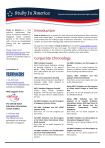The admissions interview is an extremely important part of the application process to American universities. Besides the application essay, the interview is probably the only way to get the university admission office to get a sense of your character, personality, passions and concerns. Most elite universities make an enormous effort to interview every undergraduate applicant to their school regardless of where the applicant lives. In Singapore, as in almost every country, applicant interviews to American universities are facilitated through school visits, education fairs and alumni volunteers. Since competition for top university places is, in general, more fierce in Singapore than in the U.S., applicants located outside the U.S. must place a high importance on making the best impression possible in order to separate themselves positively from their peers. Here, we highlight a few of many suggestions to make that winning impression and get the most out of your interview.
Know the school:
A university interviewer is aware that applicants apply to many other schools. However, he or she wants to see that the applicant is particularly interested in attending the university, and for the “right” reasons. Stating that a school is prestigious is NOT a good enough reason. Explain why: research the website and hardcopy brochures. Know the types of majors and courses offered and what departments (faculties) and professors are famous for their research and teaching. Find out what qualities of the school sets it apart from others. Even more important, through questions and comments, you should make it clear that you have done the research.
Know thyself:
Hopefully you did a written self-assessment before you even started the application process. With your self-assessment, researching schools becomes more tailored and less exhaustive. Do you know which teaching style, academic and extracurricular activities interest you. Have you thrived in small sized classes? Enjoyed doing volunteer work? If so, what kind of work? Do you thrive in situations when surrounded by students with similar or differing backgrounds and perspectives? See whether the school website and brochures (or third-party analysis of the school) answers these questions. If not, be sure to raise them during the interview.
Set an agenda:
You should have a list of questions that you want answered, but are not easily found on the school website. All interviewers are closely involved with the school, either as an employee of the school, or as an alumnus or alumna, or both. They serve as a rich resource of information about the school and can often answer the not-frequently-asked questions you compiled while doing your research. Most importantly, market yourself as best as you can. Have a list of core aspects about you that you want the interviewer to know before the interview ends. Prove to the university that you and your interests are a fit for the school and it’s environment while showing your academic and non-academic uniqueness. These attributes contribute to the diversity that is sought for and cherished by American universities. Diversity, a somewhat misunderstood concept, does not refer solely to racial and ethnic identity, but to what you, as a student, can uniquely contribute to the school community.
Be professional:
The interview is casual, but the interaction with the interviewer before and after the interview should not be. Play it safe and treat the admissions interview process similar to that of a job interview (that means you should groom yourself and dress business casual). Emails written in all lowercase lettering with SMS-style language leave a poor impression. Any emails to the interviewer should be written with the principles of standard written English. Check for grammar and spelling mistakes (especially the interviewer’s name!) before sending your message. Defer to the interviewer as to the place and time of the interview, unless you have a compelling reason. Sending a follow-up message thanking the interviewer after the meeting sets you apart from the others.


